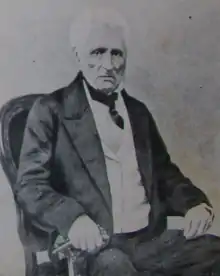Vicente Anastasio Echevarría
Vicente Anastasio Echevarría (1768–1857) was an Argentine lawyer and politician who served as Minister of the Real Audiencia de Buenos Aires.[1] He had an active participation in the events that occurred during the Invasiones Inglesas and the Revolución de Mayo. He held various honorary positions, including as secretario of the Asamblea del Año XIII.[2]
Vicente Anastasio de Echevarría | |
|---|---|
 | |
| Secretary of the Assembly of the Year XIII | |
| In office 1813–1813 | |
| Minister of the Royal Audiencia of Buenos Aires | |
| In office 1810–1811 | |
| Personal details | |
| Born | Vicente Anastasio de Echevarría y Acevedo January 22, 1768 Rosario, Argentina |
| Died | August 20, 1857 Buenos Aires, Argentina |
| Resting place | La Recoleta Cemetery |
| Spouse | María Antonia de Echevarría y Ramos |
| Occupation | politician government diplomatic laws |
| Profession | attorney |
| Signature | |
| Military service | |
| Allegiance | |
| Branch/service | Milicias criollas |
| Years of service | 1806-1810 |
| Commands | Húsares of Pueyrredón |
| Battles/wars | British invasions of the Río de la Plata May Revolution |
Biography
He was born in Rosario, Santa Fe, the son of Fermín de Echevarría, born in Álava, and Tomasa de Acevedo, a distinguished Creole lady from San Nicolás de los Arroyos. He was married to his relative María Antonia de Echevarría, daughter of José de Echevarría and María Francisca Ramos.[3] He studied at the College of San Carlos, and earned his law degree from University of Charcas.[4] He took an active part in the defense of Buenos Aires during the English invasions of 1806 and 1807, and served as secretary of Santiago de Liniers during his administration as viceroy.[5]
He was also involved in the movements of the May Revolution of 1810, taking part in that event as one of the lobbyists who voted for the removal Baltasar Hidalgo de Cisneros, as viceroy of the Río de la Plata.[6] In 1811 he was sent in diplomatic mission to Asuncion with his personal friend Manuel Belgrano, to negotiate relations between the United Provinces of the River Plate and Paraguayan government.[7] In 1812 Echevarría was appointed as Comisario de guerra of the First Triumvirate. And in 1814 served as State councilor.[8]
Towards the end of his life he dedicated himself to commercial activities, also serving as a lawyer for distinguished gentlemen of the time, like Juan Manuel Canaveris, whose daughter was related to one of his descendants.[9]
References
- Ideario de mayo, Mariano Moreno, 1960
- Asamblea del año XIII. Historia del primer congreso argentino, Pablo Camogli, 15 June 2013, ISBN 9789870429449
- Genealogía, Issues 14-15, Instituto Argentino de Ciencias Genealógicas., 1965, 1965
- Colegio Real de San Carlos: su orígen e influencia en el desarrollo de la revolución de mayo, Armando de Sousa Argüello, 1918
- Historia de la independencia económica: aporte a la formación de una conciencia industrial argentina, Eduardo Astesano, 1949
- Actas Capitulares Desde El 21 Hasta El 25 De Mayo De 1810 en Buenos Aires, Argentinaion-place=, ISBN 9781465504104
- Catálogo Sección Historia, Archivo Nacional de Asunción: síntesis revisada y, Andrea Tutté, 2008, ISBN 9789995381622
- Historia de la nación Argentina: (desde los orígenes hasta la organización definitiva en 1862), Academia Nacional de la Historia (Argentina), Ricardo Levene, 1944
- Nobiliario del antiguo virreynato del Río de la Plata ..., Carlos Calvo, 1936